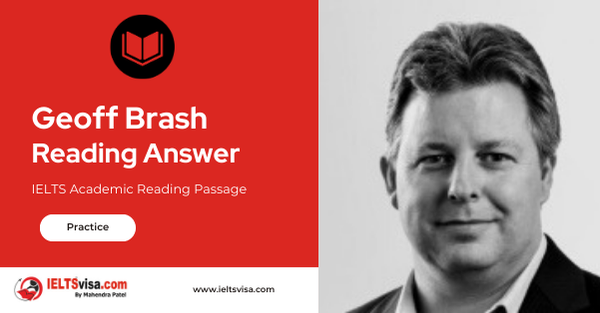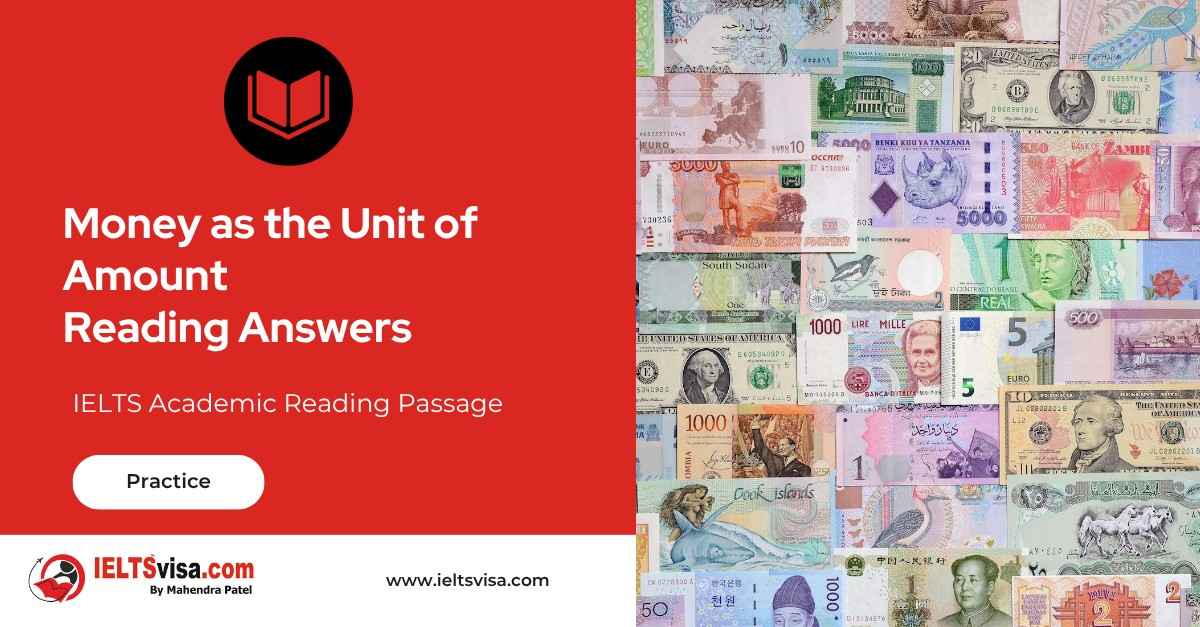Geoff Brash Reading Answer
IELTS Academic Reading Passage
Geoff Brash, who died in 2010, was a gregarious Australian businessman and philanthropist who encouraged the young to reach their potential.
Born in Melbourne to Elsa and Alfred Brash, he was educated at Scotch College. His sister, Barbara, became a renowned artist and printmaker. His father, Alfred, ran the Brash retail music business that had been founded in 1862 by his grandfather, the German immigrant Marcus Brasch, specialising in pianos. It carried the slogan ‘A home is not a home without a piano.’
In his young days, Brash enjoyed the good life, playing golf and sailing, and spending some months travelling through Europe, having a leisurely holiday. He worked for a time at Myer department stores before joining the family business in 1949, where he quickly began to put his stamp on things. In one of his first management decisions, he diverged from his father’s sense of frugal aesthetics by re-carpeting the old man’s office while he was away. After initially complaining of his extravagance, his father grew to accept the change and gave his son increasing responsibility in the business.
After World War II (1939-1945), Brash’s had begun to focus on white goods, such as washing machines and refrigerators, as the consumer boom took hold. However, while his father was content with the business he had built, the younger Brash viewed expansion as vital. When Geoff Brash took over as managing director in 1957, the company had two stores, but after floating it on the stock exchange the following year, he expanded rapidly and opened suburban stores, as well as buying into familiar music industry names such as Allans, Palings and Suttons. Eventually, 170 stores traded across the continent under the Brash’s banner.
Geoff Brash learned from his father’s focus on customer service. Alfred Brash had also been a pioneer in introducing a share scheme for his staff, and his son retained and expanded the plan following the float.
Geoff Brash was optimistic and outward looking. As a result, he was a pioneer in both accessing and selling new technology, and developing overseas relationships. He sourced and sold electric guitars, organs, and a range of other modern instruments, as well as state-of-the-art audio and video equipment. He developed a relationship with Taro Kakehashi, the founder of Japan’s Roland group, which led to a joint venture that brought electronic musical devices to Australia.
In 1965, Brash and his wife attended a trade fair in Guangzhou, the first of its kind in China; they were one of the first Western business people allowed into the country following Mao Zedong’s Cultural Revolution. He returned there many times, helping advise the Chinese in establishing a high quality piano factory in Beijing; he became the factory’s agent in Australia. Brash also took leading jazz musicians Don Burrows and James Morrison to China, on a trip that reintroduced jazz to many Chinese musicians.
He stood down as Executive Chairman of Brash’s in 1988, but under the new management debt became a problem, and in 1994 the banks called in administrators. The company was sold to Singaporean interests and continued to trade until 1998, when it again went into administration. The Brash name then disappeared from the retail world. Brash was greatly disappointed by the collapse and the eventual disappearance of the company he had run for so long. But it was not long before he invested in a restructured Allan’s music business.
Brash was a committed philanthropist who, in the mid-1980s, established the Brash Foundation, which eventually morphed, with other partners, into the Soundhouse Music Alliance. This was a not-for-profit organisation overseeing and promoting multimedia music making and education for teachers and students. The Soundhouse offers teachers and young people the opportunity to get exposure to the latest music technology, and to use this to compose and record their own music, either alone or in collaboration. The organisation has now also established branches in New Zealand, South Africa and Ireland, as well as numerous sites around Australia.
Questions 1-5
Do the following statements agree with the information given in Reading Passage 1? Write
TRUE if the statement agrees with the information FALSE if the statement contradicts the information NOT GIVEN if there is no information on this
- ……………….. The Brash business originally sold pianos.
- ……………….. Geoff Brash’s first job was with his grandfather’s company.
- ……………….. Alfred Brash thought that his son wasted money.
- ……………….. By the time Geoff Brash took control, the Brash business was selling some electrical products.
- ……………….. Geoff Brash had ambitions to open Brash stores in other countries.
Questions 6-10
Answer the questions below.
Choose NO MORE THAN THREE WORDS OR A NUMBER from the passage for each answer.
6.Which arrangement did Alfred Brash set up for his employees? 6…………………
7.Which Japanese company did Geoff Brash collaborate with? 7…………………
8.What type of event in China marked the beginning of Geoff Brash’s relationship with that country? 8…………………
9.What style of music did Geoff Brash help to promote in China? 9…………………
10.When did the Brash company finally stop doing business? 10…………………
Questions 11-13
Complete the notes below.
Choose ONE WORD ONLY from the passage for each answer.
Soundhouse Music Alliance
–Grew out of the Brash Foundation.
– A non-commercial organisation providing support for music and music
11………………..
–Allows opportunities for using up-to-date 12…………………
–Has 13..………………. in several countries.

Solution for: Geoff Brash Reading Answer
| 1. TRUE | 8. (a) trade fair |
| 2. FALSE | 9. jazz |
| 3. TRUE | 10. 1998 |
| 4. TRUE | 11. education |
| 5. NOT GIVEN | 12. technology |
| 6. (a) share scheme | 13. branches |
| 7. Roland/ Roland group/ the Roland group |
Review and Practice
- Regularly practice with IELTS reading samples and time yourself to get used to the pressure of the exam.
- Review your mistakes to understand where you went wrong and how to avoid similar errors in the future.
Our Books
Master IELTS Speaking Part 1
IELTS Writing Task 1 Book
IELTS Writing Task 2 Book
Geoff Brash Reading Answer Explanation
Comin Soon
Practice IELTS Other Modules
IELTS Listening
The IELTS Listening test assesses how well you can understand spoken English in various contexts. It lasts about 30 minutes and is divided into four sections with a total of 40 questions. The listening tasks become increasingly difficult as the test progresses.
IELTS Academic Reading
The IELTS Academic Reading section assesses your ability to understand and interpret a variety of texts in academic settings. It is designed to evaluate a range of reading skills, including skimming for gist, reading for main ideas, reading for detail, understanding inferences, and recognizing a writer's opinions and arguments.
IELTS Speaking
The IELTS Speaking test assesses your ability to communicate in English on everyday topics. It lasts 11-14 minutes and consists of three parts: introduction, cue card, and a discussion based on the cue card topic.
IELTS General Reading
IELTS General Reading tests your ability to understand and interpret various types of texts. Here are some key areas and types of content you can expect to encounter in the reading section, along with tips for effective preparation.
IELTS Academic Writing Task 1
In IELTS Academic Writing Task 1, you are presented with a visual representation of information, such as graphs, charts, tables, or diagrams, and you are required to summarize, compare, or explain the data in your own words.
IELTS General Writing Task 1
In IELTS General Writing Task 1, you are required to write a letter based on a given situation. The letter can be formal, semi-formal, or informal, depending on the prompt. Here’s a breakdown of the key components to include in your letter
IELTS Academic Writing Task 2
In IELTS Academic Writing Task 2, you are required to write an essay in response to a question or topic. Here’s a guide to help you understand the essential elements of this task
IELTS Exam Tips
To succeed in the IELTS exam, practice regularly, familiarize yourself with the test format, improve your vocabulary, develop time management skills, and take mock tests to build confidence.
Grammer for IELTS
Grammar is the foundation of effective communication in English. Understanding tense usage, subject-verb agreement, and sentence structure enhances clarity and coherence in writing and speaking.
Vocabulary for IELTS
Vocabulary plays a crucial role in the IELTS (International English Language Testing System) exam, especially in the Speaking and Writing sections. Here’s an overview of why vocabulary is important and how it impacts your performance
RECENT IELTS SAMPLES QUESTIONS AND ANSWERS
Walking with dinosaurs
Peter L. Falkingham and his colleagues at Manchester University are developing techniques that...
Money as the Unit of Amount Reading Answers
The most difficult aspect of money to understand is its function as a unit of account. In...
WEATHERING IN THE DESERT
In the deserts, as elsewhere, rocks at the earth's surface are changed by weathering, which...
Nature on Display in American Zoos
The first zoo in the United States opened in Philadelphia in 1874, followed by the Cincinnati...
Can We Prevent the Poles From Melting
Such is our dependence on fossil fuels, and such is the volume of carbon dioxide we have...
Air conditioning the earth reading answers
The circulation of air in the atmosphere is activated by convection, the transference of heat...













